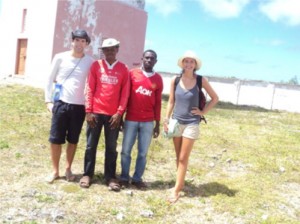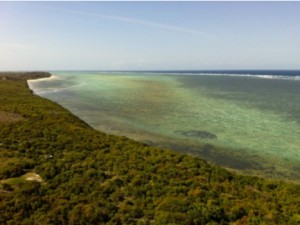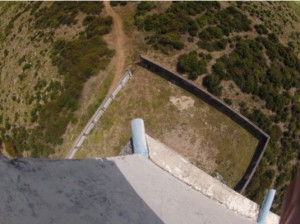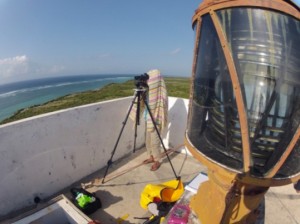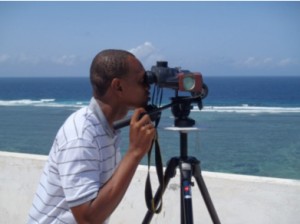Zanzibar Humpback Whale Research Project 2012
Blog 9: A Friendly New Face, 03/08/2012
On the 29th of July the team was very happy to welcome a new local student to the Zanzibar Humpback Whale Project. Khamis Khamis is a second year undergraduate student at the University of Dar Es Salaam where he is studying for a Bachelor of Science in Aquatic Environmental Science and Conservation. Khamis is happy to join the Project this year and hopes that this experience will give him further knowledge about the whales around Zanzibar. Karibu Zanzibar Humpback Whale Project, Khamis!
Nat, Yussuf, Khamis & Lynne
After an incredibly busy ten days of conducting both lighthouse and boat-based surveys we finished the lighthouse pilot study on Friday the 3rd of August. Overall, the addition of the lighthouse surveys resulted in more logistics for the team; every day we were busy working in sub-teams for boat and lighthouse surveys so had to organize food for both teams, coordinate timing of boat departures and travel by car to Makunduchi, and established new data collection protocols and their related databases. Despite the additional effort the team was very pleased with the data we collected from the Makunduchi lighthouse!
Makunduchi, on the southeast end of Zanzibar (Unguja) Island, appears to be one of the most popular areas for the whales in our survey area; almost every morning we receive fisher’s reports of whales and we often observe them there while conducting boat-based surveys. It takes about one hour to travel by survey boat from Kizimkazi-Dimbani to Makunduchi and, being more exposed to the open sea of the Indian Ocean, we are often unable to survey in the area due to the less protected, rougher seas that often occur here. The opportunity to conduct land-based surveys at Makunduchi allowed us to collect previously inaccessible data.
View from Makunduchi lighthouse looking up the east coast of Zanzibar
View looking down from the Makunduchi lighthouse
Over the course of the lighthouse pilot study, whales were seen almost every day and their behaviour and respiration rates could be easily recorded…whale blows are easy to spot when you are viewing an expanse of sea from 44 m above sea level! We collected data on their behaviours and respiration rates and were able to do so in a way similar to our boat behaviour surveys. We could time the surface intervals (times the whales were at the surface breathing between dives) and a variety of behaviours including traveling, resting and socializing. It was spectacular watching huge breaches, often multiple ones, from the lighthouse! One day we had a wonderful observation of one animal doing nine pectoral-fin slaps in just over a minute, just off the shelf edge below the lighthouse! In addition to tracking the whales’ movement we performed boat scans at regular intervals with the intention to collect data on interactions between vessels and whales.
Kristin keeping out of the sun while scanning from the lighthouse
By conducting land-based surveys from the lighthouse we could easily track animals in the area and had so much success viewing animals that we had to establish a protocol for tracking multiple groups of whales. We had to decide which, of often many, groups of whales we would track and for how long we would focus on an single group. By the end of the ten day study we had figured out what to do when we had multiple sightings at a time…which was the case most days!
Yussuf scanning from the lighthouse
Due to the success of the land based surveys we intend to collect more of this data next year and for the extent of the research season. It will result in a busy season for the team in 2013 but we will surely get some great data to assess the presence of whales, their behaviours, and their interactions with vessels around southern Zanzibar.
Finally, we would like to extend thanks to the community of Makunduchi for allowing us to work at the lighthouse in their village. Without their willingness to support this research, data collection from the lighthouse would not be possible!
Photographs © Zanzibar Humpback whale Project

